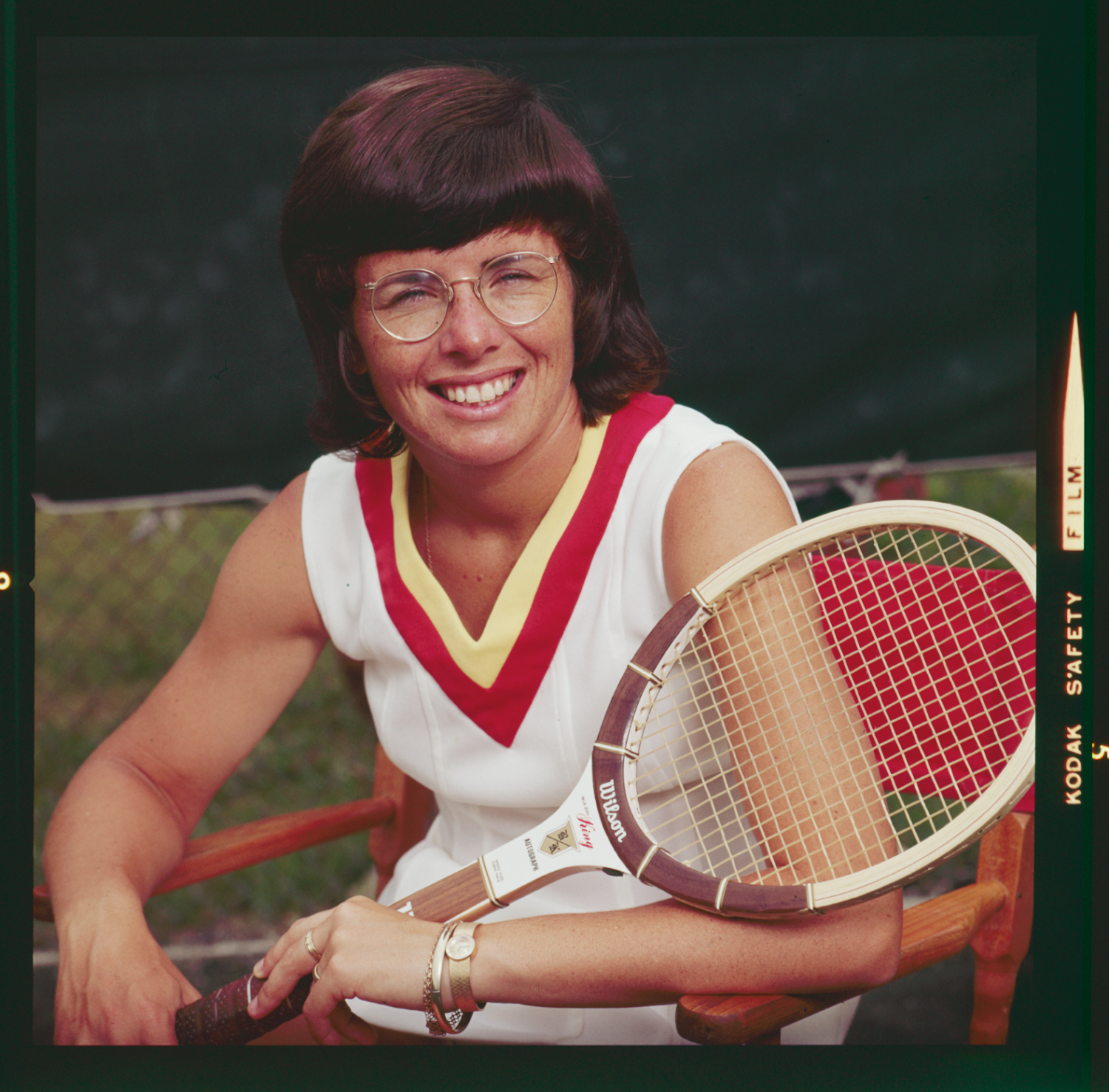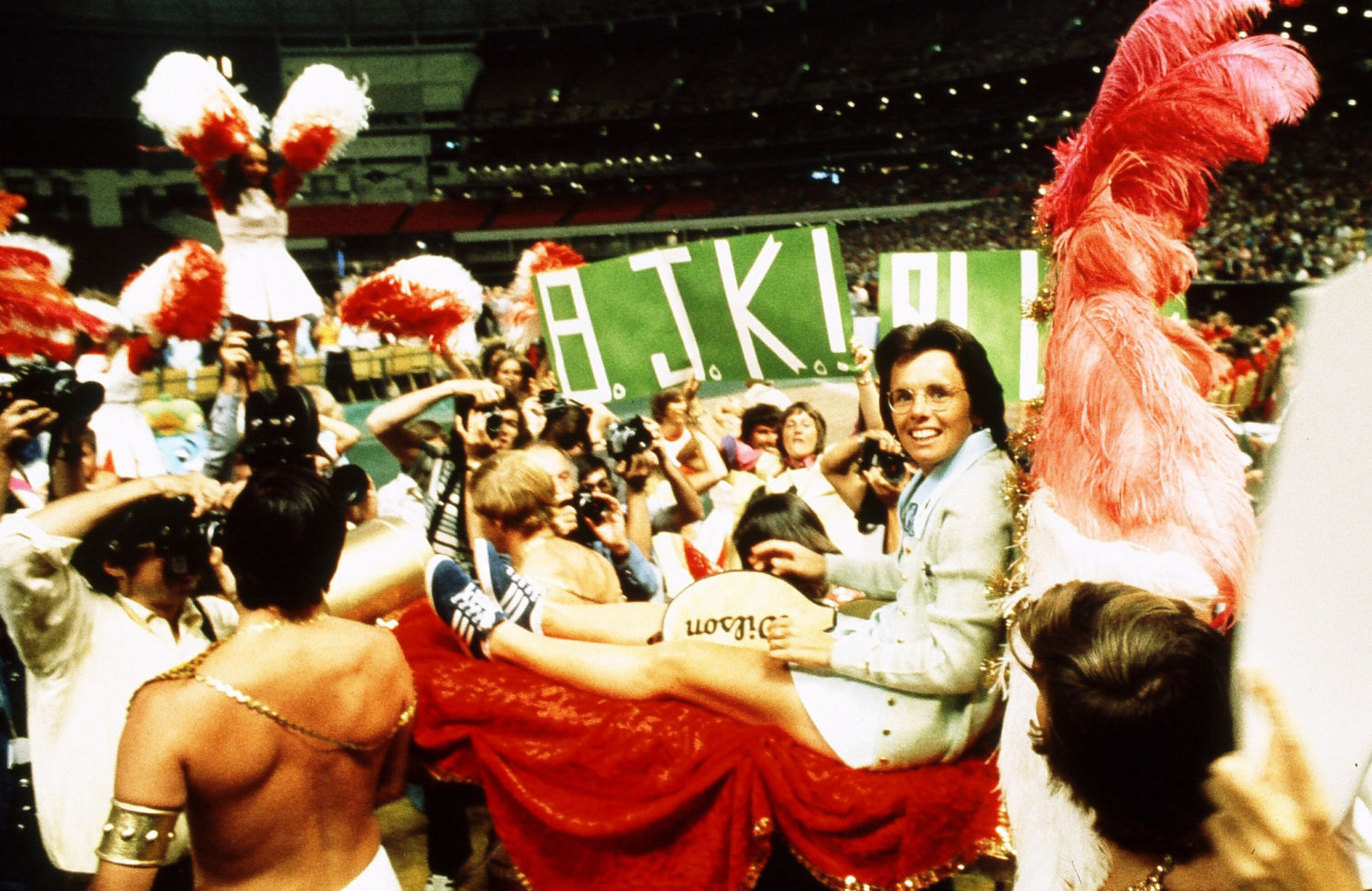Billie Jean King
The Shooting Star
By Chris Oddo

1969
The Billie Jean King Autograph racket:
The beautiful balanced Strata Bow racket used by Billie Jean King in her record fifth Wimbledon victory, this racket offered long handle pallets to reduce torque, and adds strength and stiffness to the shaft and flexibility to the head.
“Tennis gave me a platform for change and a voice to make a difference in the lives of others,” King concludes.
Hitting 75 has not slowed down the legendary Billie Jean King. As the times change, her push for equality and inclusion holds even more importance.
Larger than tennis and larger than life.
That’s Billie Jean King—past, present and future.
The brightest star in a tennis firmament littered with legends and luminaries, King is the beacon of light that won the Battle of the Sexes over trash-talking Bobby Riggs and later won over the hearts and minds of tennis’ most ruthless power brokers. A determined do-gooder that never learned the meaning of the word “quit”, King rose to fame, changed the game and tennis would never be the same.
It all started from humble roots.
As the story goes, King turned to her mother while washing dishes at the age of five and said: “I am going to do something great with my life.”
Another formative experience, when she was eleven years old, spurred King further on: “Ever since that day when I was eleven years old and I wasn’t allowed in a photo because I wasn’t wearing a tennis skirt, I knew that I wanted to change the sport,” King recalls.
The greatness lies not in the statement, or in the desire to make a difference, but in the follow-through. King didn’t just dream big, she played big. So big that Wilson made her the first woman to ever have a signature racket named after her, an honor bestowed on only five players in history, long before she found her voice as an activist.
Later in life, when the opportunity to affect change and become a vital role model presented itself, King molded those words into action.
It was all part of a singular mission that came naturally to the Southern California native—and it is a mission that is never complete in King’s mind.
“As far as my legacy… I am not done yet,” King says, emphatically.
Blessed with the poise and panache that would eventually take her to a record 20 Wimbledon titles (and a whopping 39 major titles in total), King lit a fire under tennis in the early 70’s when she founded the WTA Tour and gave female athletes a voice that they had never had before. It was King’s talent on the court that pushed her into the public eye, but it was her humanity, open-mindedness and passion for justice that made her the chosen woman, the one with the power to make a difference and change the sport of tennis from the foundation up.

Would tennis as a professional sport have enjoyed such incredible success in the Open era without the thriving women’s tour that King and her disciples created? Would men and women be receiving the same prize money at all four Grand Slams today if it had not been for the sacrifices that King and her generation made? Probably not.
Known as a shapeshifter who transcended the sport of tennis, King was a true pioneer for equality and social justice.
She still is, even today.
“My generation was the transition generation and because of what we were able to accomplish in 1968 and the decade beyond, tennis is a leader in the world of sports today” King says, as she proceeds to list a few transitional moments that she herself spearheaded. “The start of the Virginia Slims Series and the impact the Original 9 and Gladys Heldman had on tennis in 1970 changed the sport; securing equal prize money for the 1973 US Open changed the sport; the creation of the Women’s Tennis Association in 1973 changed the sport; the Battle of the Sexes match against Bobby Riggs in 1973 elevated the sport to new levels.”
King’s dominance and athleticism is sometimes an afterthought due to her success in other realms. We rarely hear about all the Grand Slam titles that she has won, but her success off the court would not have been possible without success on it.
We mustn’t forget that King was an absolute dynamo on the tennis court. A spritely figure at 5’4 ½, she played with the confidence and courage of a giant. Her aggressive style wreaked havoc on her opponents, and she was an absolute force at the net.
“She had one of the best volleys—ever” her former doubles partner Rosie Casals says.
Six decades after she won her first major singles title, Kings’ significance continues to grow. Like the brightest stars in the galaxy that take billions of years to burn out, Kings’ influence and impact is just beginning to take hold on the sporting world.
She is tennis’ original activist and its greatest treasure. Young players flock to her, pining for selfies and words of wisdom, which she is always quick to share.
“Tennis gave me a platform for change and a voice to make a difference in the lives of others,” King concludes.
She is the shooting star that never missed her target. The timeless legend that coined the phrase “pressure is a privilege” and the spiritual center of a sport that never stops pushing forward.
And we are lucky to have her.
